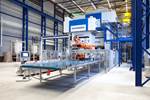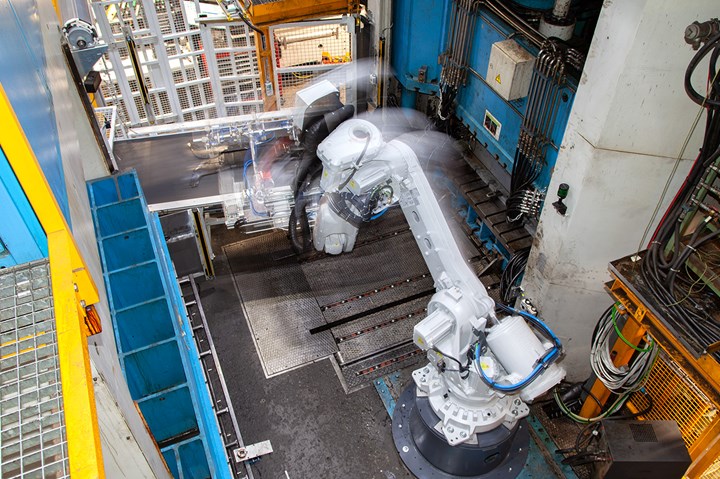Autoneum future-proofs GFRTP production with Evoris digitalization platform
Extensive plant modernization includes new automation and digitalization solutions procured from Dieffenbacher.
Dieffenbacher installed a new line control system that includes the safety PLC and three six-axis robots. Photo Credit: Dieffenbacher
Swiss company Autoneum (Winterthur) operates five Dieffenbacher (Eppingen, Germany) automotive component production lines at its Sevelen, Switzerland site. Together with Dieffenbacher, Autoneum has now extensively modernized one of the lines, a GMT/D-LFT line for glass fiber-reinforced thermoplastics (GFRTP). One highlight of the project was the introduction of the Evoris digitalization platform.
The modernized GMT/D-LFT line introduces a new line control system, including the safety PLC and three six-axis robots. In addition, various motion sequences of the loading and unloading robots were optimized. Reis robots were retired during the modernization; however, Autoneum says it was able to map its processes and comply with all safety requirements with the new robots despite the tight space conditions.
“We can now use our GMT/LFT-D system in a cycle-time-optimized manner,” Christoph Bless, head operational maintenance and repair at Autoneum, says. “The availability of the plant components is guaranteed.”
To further optimize production, Autoneum decided to implement the Evoris digitalization platform as well. Evoris uses artificial intelligence (AI) to make plants faster and more efficient. “Our goal is to operate our systems with high availability and as sustainably as possible while ensuring the right component quality,” Bless emphasizes. “Evoris gives us much better insights into our production and better possibilities to influence it.” The platform is said to be key to Autoneum’s sustainability, energy savings and profitability.
Bless calls Dieffenbacher’s expertise the decisive factor in moving forward with the digitalization project. “Dieffenbacher’s approach stands out from the crowd,” he continues. “They offer the complete package, everything from the platform to sensor technology and plant know-how to technologist knowledge for the entire production line. In addition, Dieffenbacher coordinated the entire integration. We look forward to their further development of Evoris.”
Autoneum uses Anomaly Detection, Curve Analysis and Component History apps on the Evoris platform, which collects all plant data at a central point. As a result, Autoneum is able to gain deeper insight into its production processes via trending and condition monitoring tools and various reporting possibilities. The company uses this transparency across the entire plant to accelerate decision-making, improve processes, increase machine availability, boost energy efficiency and optimize maintenance.
Related Content
-
Welding is not bonding
Discussion of the issues in our understanding of thermoplastic composite welded structures and certification of the latest materials and welding technologies for future airframes.
-
Infinite Composites: Type V tanks for space, hydrogen, automotive and more
After a decade of proving its linerless, weight-saving composite tanks with NASA and more than 30 aerospace companies, this CryoSphere pioneer is scaling for growth in commercial space and sustainable transportation on Earth.
-
TU Munich develops cuboidal conformable tanks using carbon fiber composites for increased hydrogen storage
Flat tank enabling standard platform for BEV and FCEV uses thermoplastic and thermoset composites, overwrapped skeleton design in pursuit of 25% more H2 storage.
















